In the present day and age, we have a lot of important things. But one of the most important is Recycling. These days, if you look around you, there is a lot of garbage on the streets which are not properly disposed of, dirty rivers. Which causes land and air pollution. And this is because you and I are not really playing our part to keep our environment clean and green. Because we don’t know what is the actual importance of recycling.
Our planet is blessed with so many resources and recycling remains one of the options to preserve these resources. But firstly, what is Recycling? This is referred to as the process of gathering used materials which are generally known as ‘waste’. And reprocessing them. This system involves the sorting out of used materials, which are then reprocessed. Later converted into raw materials for the manufacturing of new products. In a simpler term, it is the reprocessing of waste or used materials.
Some countries are known to be successful when it comes to minimizing the waste. And used materials going to the landfill while some have a poor environmental rating. Countries such as Germany remain a great example when it comes to recycling. At least 65% of their public wastes are composted. The United States accounts for about 35% of their public waste. As of 2013, Canada could only recycle 24% of its public waste. And Turkey has a rate as low as one percent.
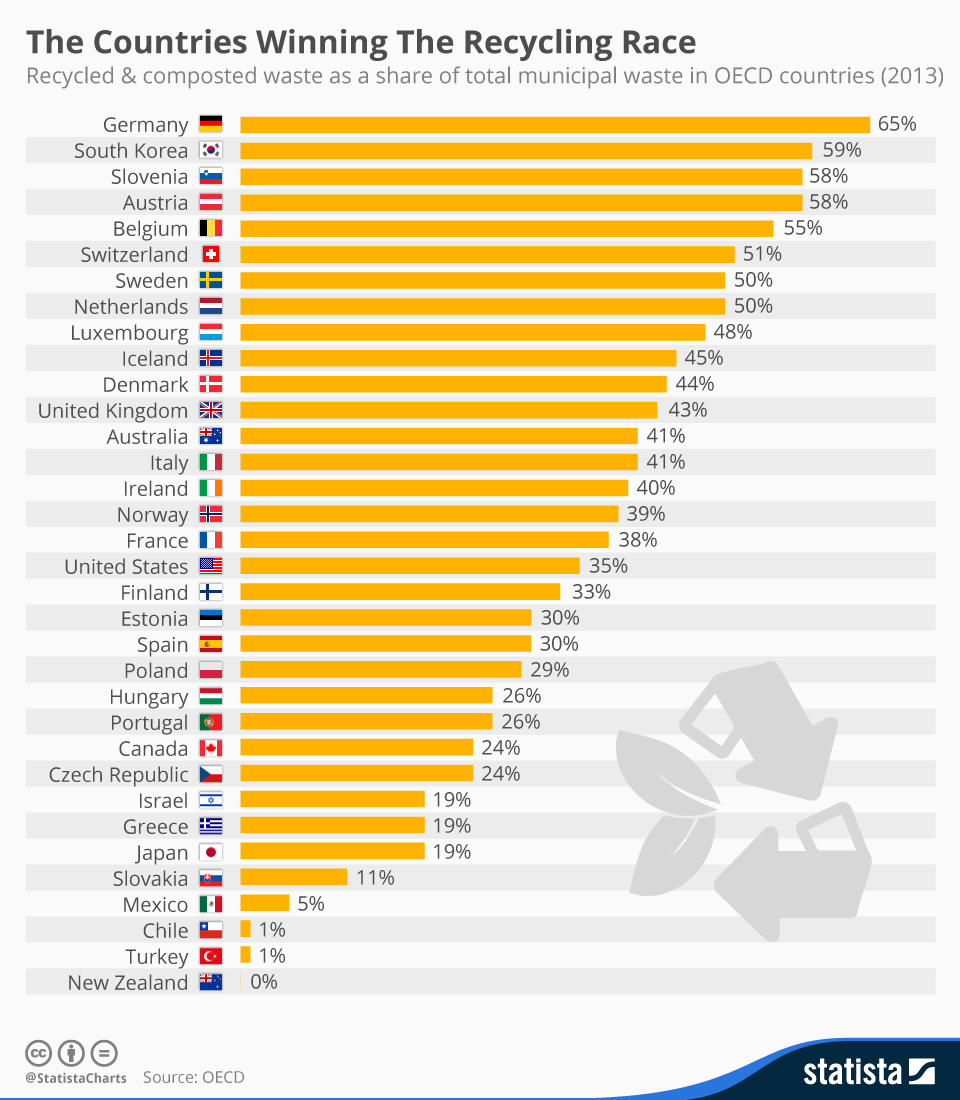
Source: Statist
It is known that a common person produces nearly 5 pounds of rubbish per day. This shows that a head produces about 1,825 kilos of trash in one year. Now, take a look at the billions of people on earth and think about the numbers of garbage that were produced, horrifying right? But it remains disturbing that a little percent of our public waste is been composted. Even the USA Environmental protection enterprise (EPA) estimated that we can recycle 75 percent of our waste but it is painful that just 30% of these wastes are recycled.
If you talk a walk on the campus, in a park, or in businesses and in homes you will surely come across a trash can absolutely be several things in it that can be recyclable. Also, if you check a landfill, there are also many more reusable materials filling it up. As much as these reusable items are, a greater percent of them are not recycled. Some of them later end up in the ocean.
According to research, every year, almost 1.5 million kilos of waste ends up in the ocean. And this can cause disastrous effects on the animals living in the ocean. I know you will be interested in knowing the possible effects of not recycling. Without further ado, let’s check them out.
Effects of Not Recycling
- Landfill Issues
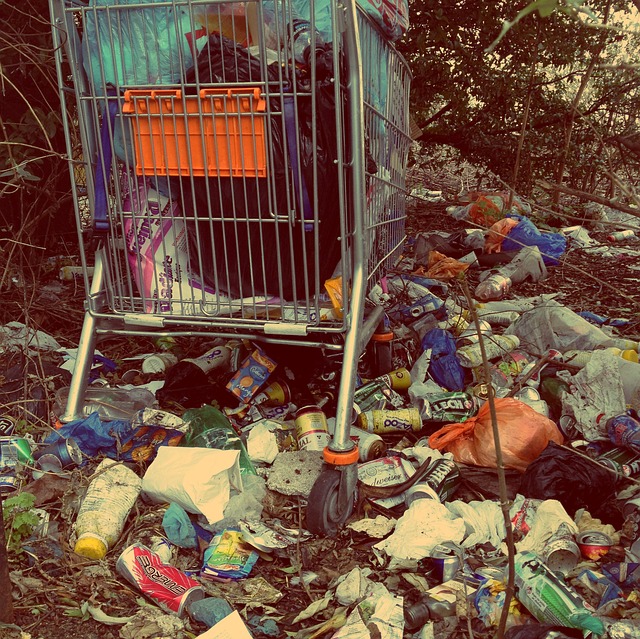
If you fail to recycle your items, they end up anywhere. And mostly, it does not end up in the right place. In the overpopulated areas, the overfilling of landfills has become a real issue recently, as the amount of waste keep growing than more it can decompose.
Reusable products including paper, cardboard, and plastic can reduce the scale of our landfills to one. One thing you should note is that most recyclable materials take a long time to decompose. For example, metals and plastics take up to hundreds, if not thousands of years to decompose. A study by postconsumers.com shows that it could take 1 plastic bottle a minimum 450 of years to decompose!
Additionally, these landfills can be smelly and poisonous due to the dangerous chemicals that come out of these products like cleansing materials and batteries. So you can actually see why minimizing these landfills is very important.
- Wasting Resources
There are a lot of products that are made from recycled materials, which I believe you have come across. Though some are made from a certain percentage we have got other products that are hundred percent recycled substances.
On the other hand, if a product created does not include any recycled item, this means the raw materials were harvested, reducing the store of resources. For example, take a look at a paper; we could actually get the paper derived from recycled paper products, however, most paper is a virgin. Trees were brought down and harvested at a mill. This method reduces our resources, wipes out the natural habitats of other creatures and also gives rise to deforestation.
- Effects on Seas and Oceans
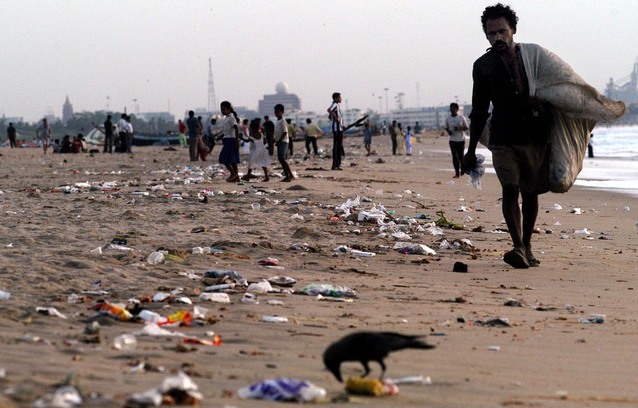
In the more populated cities, loads of the waste ends up in the seas and ocean. And this involves quite a lot of materials that could have been reused. In reality, one of the main worries about waste products is the great number of plastic that ends up inside the ocean.
This plastic can be in the ocean for many years and becomes a great hazard to the animals which live in the oceans. They may be killed by getting stuck in lengthy pieces of loose plastic or inhaling small pieces of this plastic. If all these plastics are recycled, none of them will get into the ocean which will help to preserve the lives of the oceanic animals.
- New Production Cost
Not only does the creation of new products reduce the resources in our environment, it is also economically expensive. For instance, if we are to make new water bottles, it will require a massive production of oil yearly for its production.
A study from All-Recycling-facts.com shows that the use of new aluminium can cost two times as much as the use of recycled aluminium due to the fact that a lot of energy will be needed to extract raw aluminium. Also, this shows that products made from recycled material can be bought at a less expensive rate, which is remarkable for both consumers and businesses.
- Lack of Fossil Fuels
Fossil fuels are known to be gotten from the remains of small water plant matter and creatures (fossilized) that survived during the Carboniferous period; this was about 350 million years ago. Presently, it is estimated that this reserve will seize to exist by the year 2050 or thereabouts. Meanwhile, Producers rely solely on the use of fossil fuels to make plastics and nylon. But if we should recycle plastics, the need for fossil fuels will be greatly reduced especially in the production sector where it is a material resource.
Before I move to the main topic which is the importance of recycling, let’s look at how recycling is been processed.
Process of recycling
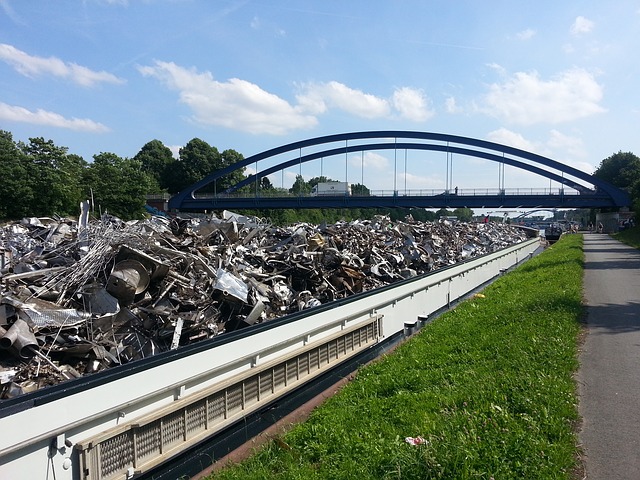
The process of recycling involves three levels. During the first stage, the used products are accumulated and processed, they are then sorted, made clean and get ready for recycling or production of new products. The next stage involves the producing of new products from the raw material acquired by the processing of the used products. The last stage involves purchasing of recycled items by the consumers.
The more we start to buy these recycled products, the better the achievement of the process can be ensured. Buying these products will only increase when each person understands the difference that can be made when we utilize our used household items as raw materials to create new products and thereby help our environment through recycling. Now, let’s take a look at why recycling is important.
Since waste creates a great negative impact in our environment, recycling remains very important. It is one of the best ways for us to have a good impact in our world, save our depleting natural resources and protect the environment for the future generation. Below are the reasons why recycling is important.
What Is The Actual Importance Of Recycling
-
It Saves Energy
A great amount of energy consumed for production is saved when fresh items are created from the raw materials gotten from recycled items. Since most new products are gotten from ‘virgin materials’, the amount of energy used is greater.
Also, the energy needed to obtain and transport these ‘virgin’ materials from their sources is also saved. Furthermore, the energy which is needed to protect and clean the surroundings from the pollutant waste products is saved, especially the non-biodegradable such as plastic that fills up the landfill regions.
-
Reduces Pollution and Saves Environmental Conditions
With the help of recycling, the global climate change can decrease to a greater extent. By reducing the energy spent on industrial production, there greenhouse gas emission is also reduced. Also, some of the major fossil fuels such as gas, diesel, coal, and so on used in most manufacturing industries emit dangerous gases such as sulfur dioxide, methane, carbon-dioxide to the surroundings.
When new raw materials are been processed, toxic substances are release which then pollutes the surroundings. By recycling, fuel usage is minimized which in turn reduces the number of harmful pollutants. And toxic substances to the environment. Also, there will much less trash to incinerate which will help to reduce air pollution and reduces greenhouse gases in the air.
-
It Saves Natural Resources
Since recycling entails the processing and usage of the main elements of a used item for the manufacturing of new products. This helps to preserve our natural resources to a large extent. For instance, if an old newspaper is recycled, cutting down of trees for another new paper product won’t be necessary. Looking at this, you can see that proper recycling can assist us in preserving our natural resources for the next generation, thereby, maintaining balance in nature.
-
It Benefits The Economy
Just like the natural and energy resources, it also helps save many expenses needed to manufacture new products from ‘virgin’ raw materials. Such expenses involve the whole production cycle starting from obtaining the raw substances, transporting them from their place of origin to their place of production, manufacturing and processing costs.
Also, recycling provides employment opportunities to a whole lot of people, which are involved in its process which in turn helps to contribute to the development of the country’s economy.
-
It Saves Space For Waste Disposal
A lot of the landfill sites are filled up with many waste products that could have recycled effectively. Many of these waste products are non-biodegradable which could take a hundred years to decompose. With recycling, these waste products are rightly used and this helps save space for landfills. If you check the landfills around, the pace with which they get filled up is alarming. If we don’t start to recycle, we might run short of landfills.
-
Production of Electricity
Recycling of biodegradable waste is used for the production of electricity. Biodegradable materials are known to emit methane. If this is done in a large-scale level, the emissions from this methane can produce sufficient power to a small area.
Another benefit of recycling these biodegradable materials is that some of these substances are very rich in soil nutrients. So when recycled, it is best used for fertilizers.
Here are some Interesting facts on recycling you might not know:
Facts of recycling
- Every ton of a mixed paper recycled can preserve energy equal to about 185 gallons of gas.
- Every day, every person produces about around 4.7 pounds of waste.
- Glass containers recycled can help save about 9 gallons of gas.
- If we recycle 125 aluminium cans, it can save energy that is enough to supply electricity to at least one home for 1 day.
- In the United States, 12.6% of their solid waste is burned using combustion facilities. 54% of this waste is dumped in the landfill area and only about 33.4% stable is recycled.
- In just 6 weeks, we can reuse recycled aluminium cans.
- If we recycle aluminium, it can save enough that is enough to power a 100-watt bulb for 20 hours, a television for two hours and a laptop for three hours.
- If we recycle a glass bottle, it can save a small amount of energy that is enough to power a computer for 25 mins.
- One interesting fact about glass is that it can never decompose. And it is possible to recycle as many times as possible. It is a fact that a glass bottle could take about one million years to decompose.
- Papers recycled produce much less air pollution than when made from raw materials.
Now you know “what is the actual importance of recycling” and along with benefits and facts of recycling.
Also, here are a few hand-picked articles for you to read next:
- What Are The Effects Of Volcanoes On The Environment?
- What Does Nature Give Us?
- How Are Mountains Useful To Us?
- What Are The Uses Of Rivers?
- Why Is Renewable Energy Important For The Future?
- The Real Importance of Trees In Our Life
- How To Actually Control Air Pollution?
- How To Actually Control Noise Pollution?
- What Is The Actual Importance Of Recycling?

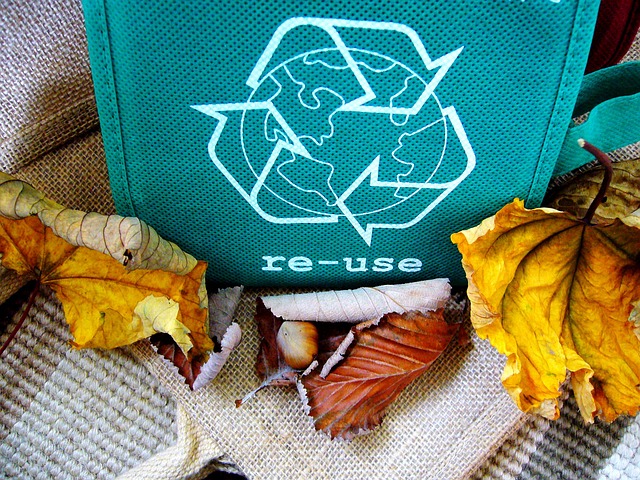
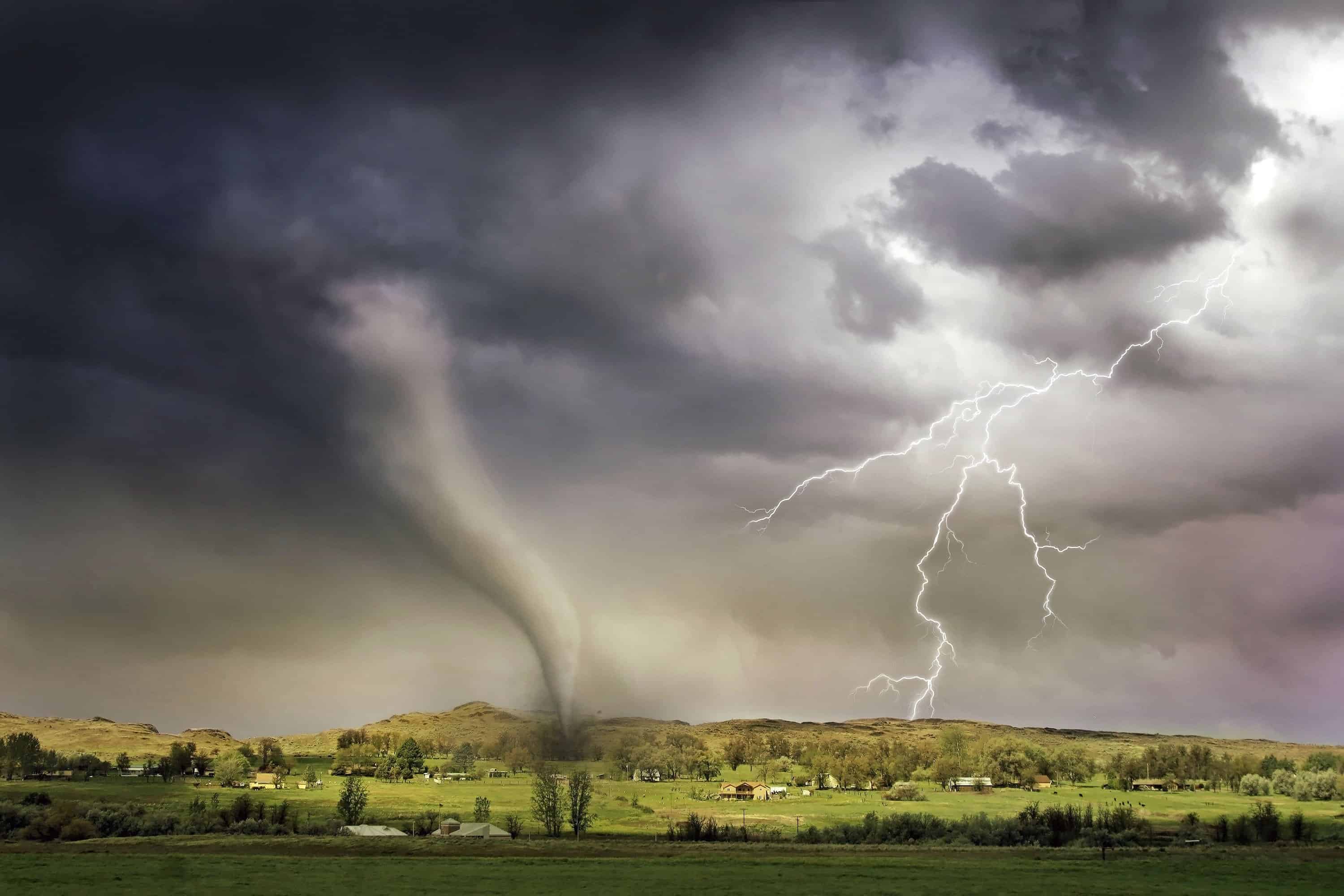

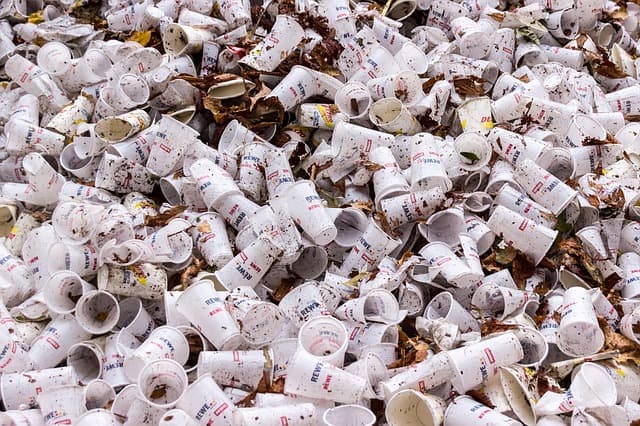
Thank you so much, Sandesh, for explaining why recycling is so important. It is great to know that recycling helps to reduce the number of harmful pollutants in the environment by minimizing fuel usage. I think it would be essential for industrial and commercial businesses to invest in a quality recycling service since they contribute a lot of waste.